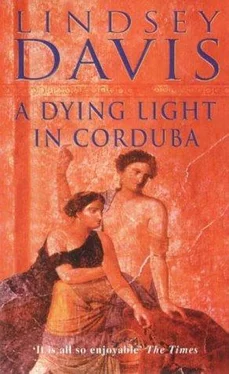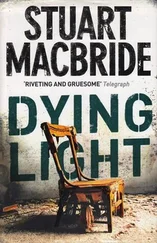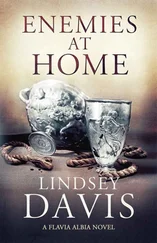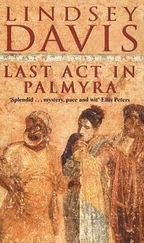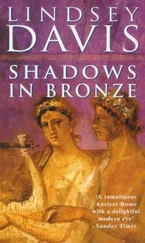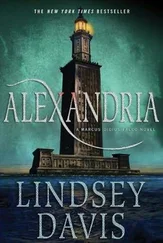Lindsey Davis - A dying light in Corduba
Здесь есть возможность читать онлайн «Lindsey Davis - A dying light in Corduba» весь текст электронной книги совершенно бесплатно (целиком полную версию без сокращений). В некоторых случаях можно слушать аудио, скачать через торрент в формате fb2 и присутствует краткое содержание. Жанр: Исторический детектив, на английском языке. Описание произведения, (предисловие) а так же отзывы посетителей доступны на портале библиотеки ЛибКат.
- Название:A dying light in Corduba
- Автор:
- Жанр:
- Год:неизвестен
- ISBN:нет данных
- Рейтинг книги:3.5 / 5. Голосов: 2
-
Избранное:Добавить в избранное
- Отзывы:
-
Ваша оценка:
- 80
- 1
- 2
- 3
- 4
- 5
A dying light in Corduba: краткое содержание, описание и аннотация
Предлагаем к чтению аннотацию, описание, краткое содержание или предисловие (зависит от того, что написал сам автор книги «A dying light in Corduba»). Если вы не нашли необходимую информацию о книге — напишите в комментариях, мы постараемся отыскать её.
A dying light in Corduba — читать онлайн бесплатно полную книгу (весь текст) целиком
Ниже представлен текст книги, разбитый по страницам. Система сохранения места последней прочитанной страницы, позволяет с удобством читать онлайн бесплатно книгу «A dying light in Corduba», без необходимости каждый раз заново искать на чём Вы остановились. Поставьте закладку, и сможете в любой момент перейти на страницу, на которой закончили чтение.
Интервал:
Закладка:
Laeta made no attempt to excuse the stupidity. He linked the fingertips of both hands. 'Put like that,' he said, with all the reasonableness of an important official who had been caught on the hop, 'it sounds as if you and I should go straight there now, Falco.'
I glanced across at Helena. She shrugged, resigned to it. She knew I hated Anacrites; she also knew that any wounded man needs help from someone sensible. One day the body bleeding in the gutter might be mine.
I had a further question: 'Anacrites runs a full complement of agents; why are they not being asked to see to this?' Laeta looked shifty; I dropped in the real point: 'Does the Emperor know what has occurred?'
'He knows.' I could not decide whether to believe the clerk or not.
At least Laeta had brought an address. It took us to a medium apartment on the south end of the Esquiline – a once notorious district, now prettied up. A famous graveyard which had once possessed a filthy reputation had been developed into five or six public gardens. These still provided a venue for fornication and robbery, so the streets were littered with broken wine jugs and the locals walked about with their heads down, avoiding eye contact. Near the aqueducts some pleasant private homes braved it out.
On the first level of living quarters in a four-storey block, up a cleanly swept stair which was guarded by standard bay trees, lived a fusspot bachelor architect called Calisthenus. He had been trapped at home all day, unwilling to leave a mugging victim who might suddenly revive and make off with his rescuer's collection of Campanian cameos.
Laeta, with unnecessary caution, refused to identify himself. I did the talking: 'I'm Didius Falco.' I knew how to imbue that with authority; there was no need to specify what post I held. 'We've come to carry off the mugging victim you so kindly took in – assuming he is still alive.'
'Just about, but unconscious still.' Calisthenus looked as if he thought he deserved our official attention. I contained my distaste. He was a thin, pale weeping willow who spoke in a tired drawl. He implied he had great ideas preoccupying him, as if he were a grand temple designer; in reality he probably built rows of little cobblers' shops.
'How did you come across him?'
'Impossible to avoid: he was blocking my exit.' 'Had you heard any disturbance last night?'
Not specially. We get a lot of noise around here. You learn to sleep through it.' And to ignore trouble until they could not step over it.
We reached a small closet where a slave normally dossed down. Anacrites was lying on the meagre pallet, while the slave watched him from a stool, looking annoyed that his blanket was being bled on. The spy was indeed unconscious. He was so ill that for a second I found him unrecognisable.
I spoke his name: no response.
There was a cloth in a bowl of cold water; I wiped his face. His skin was completely drained of colour and felt idly moist. The pulse in his neck took careful finding. He had gone somewhere very far away, probably on a journey that would have no return.
I lifted the cloak covering him, his own garment presumably. He still wore last night's reddish tunic held togetner along all its seams with padded braid in dark berry colours. Anacrites always swanked in good stuff, though he avoided garish shades; he knew how to mix comfort with unobtrusiveness.
There were no bloodstains on the tunic. I found no stabbing wounds nor general signs of beating, though he did have identical bad bruises on both his upper arms as if he had been fiercely grabbed. The side of one shin had a small cut, new and about a digit long, from which ran a dried trickle of blood, thin and straight as a dead worm. No serious wounds accounted for his desperate condition until I drew back another cloth. It had been placed at the top of his head, where it formed a wad pressed against his skull.
I peeled it off gently. This explained everything. Someone with unpleasant manners had used Anacrites as a pestle in a very rough mortar, half scalping him. Through the mess of blood and hair I could see to the bone. The spy's cranium had been crushed in a way that had probably damaged his brain.
Calisthenus, the droopy architect, had reappeared in the doorway. He was holding Anacrites' belt; I recognised it from last night. 'He was not robbed. There is a purse here.' I heard it clink. Laeta grabbed the belt and searched the purse, finding just small change in normal quantities. I didn't bother. If he hoped to discover clues there, Laeta had never dealt with spies. I knew Anacrites would carry no documents, not even a picture of his girlfriend if he had one. If he ever carried a note-tablet he would have been too close even to scratch out a shopping list.
'How did you know he belonged in the Palace, Calisthenus?'
Calisthenus handed me a bone tablet, the kind many officials wear to impress innkeepers when they want a free drink. It gave Anacrites a false name which I had heard him use, and claimed he was a palace secretary; I knew that disguise too, and presumably so did whoever at the Palace received the architect's message.
Was anything else with him?'
'No.'
I lifted the Chief Spy's lifeless left wrist, splaying the cold fingers on mine. 'What about his seal ring?' I knew he wore one; he used it to stamp passes and other documents. It was a large chalcedony oval engraved with two elephants entwining trunks. Calisthenus again shook his head. 'Sure?' He was growing indignant as only an architect can (all that practice blufling out overspent estimates and expressing disbelief that clients expect a house that looks like what they asked for…) 'No disrespect, Calisthenus, but you might have thought the ring would cover any costs you incurred in tending the victim?'
I can assure you -'
'All right. Settle down. You have rescued an important state servant; if it does impose any financial burden, send your invoice to the Palace. If the ring turns up it should be returned straight away. Now if your boy can run out for a litter, my colleague here will take this poor fellow away.'
Laeta looked put out that I assigned him to babyminding, but as we watched Anacrites being loaded into a hired chair for what could be his last journey anywhere, I explained that if I was being asked to work on the problem I had best nip off and start. 'So what is required, Laeta? You want me to arrest whoever bopped him?'
'Well, that would be interesting, Falco.' In fact Laeta sounded as if apprehending the villain was his least concern. I began to wonder if it was wise to let him escort the wounded spy back to the Palatine. 'But what investigation do you think Anacrites was working on?'
'Ask the Emperor,' I instructed.
'Vespasian is unaware of any major exercise that could be relevant.' Did that mean the Emperor was being kept in ignorance – or simply that the intelligence network had no work? No wonder Anacrites always gave the impression he feared compulsory retirement was lurking just around the corner.
'Have you tried Titus?' The Emperor's elder son shared the business of government. He happily involved himself in secrets.
'Titus Caesar had nothing to add. However, it was he who suggested bringing in your good self.'
'Titus knows I won't want to tangle with this!' I growled. 'I told you: interview Anacrites' staff. If he was on to something, he will have had agents out in the field.'
Laeta was frowning. 'I have been trying, Falco. I cannot identify auy agent he was using. He was very secretive. His record-keeping was eccentric to say the least. All the named employees on his bureau's roll seem very low-grade runners and messengers.'
I laughed. 'No operative who worked for Anacrites would be high class!'
'You mean he couldn't choose good people?' Laeta seemed pleased to hear it.
Читать дальшеИнтервал:
Закладка:
Похожие книги на «A dying light in Corduba»
Представляем Вашему вниманию похожие книги на «A dying light in Corduba» списком для выбора. Мы отобрали схожую по названию и смыслу литературу в надежде предоставить читателям больше вариантов отыскать новые, интересные, ещё непрочитанные произведения.
Обсуждение, отзывы о книге «A dying light in Corduba» и просто собственные мнения читателей. Оставьте ваши комментарии, напишите, что Вы думаете о произведении, его смысле или главных героях. Укажите что конкретно понравилось, а что нет, и почему Вы так считаете.
